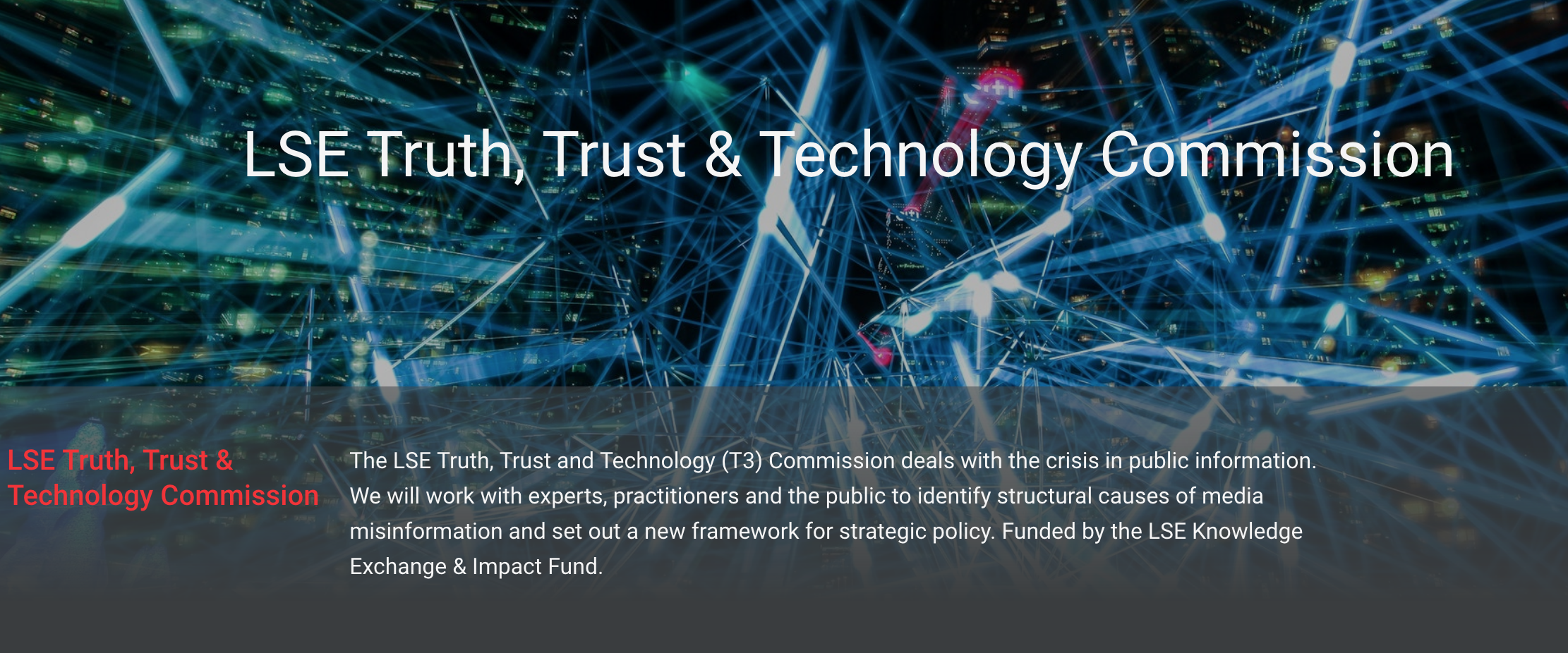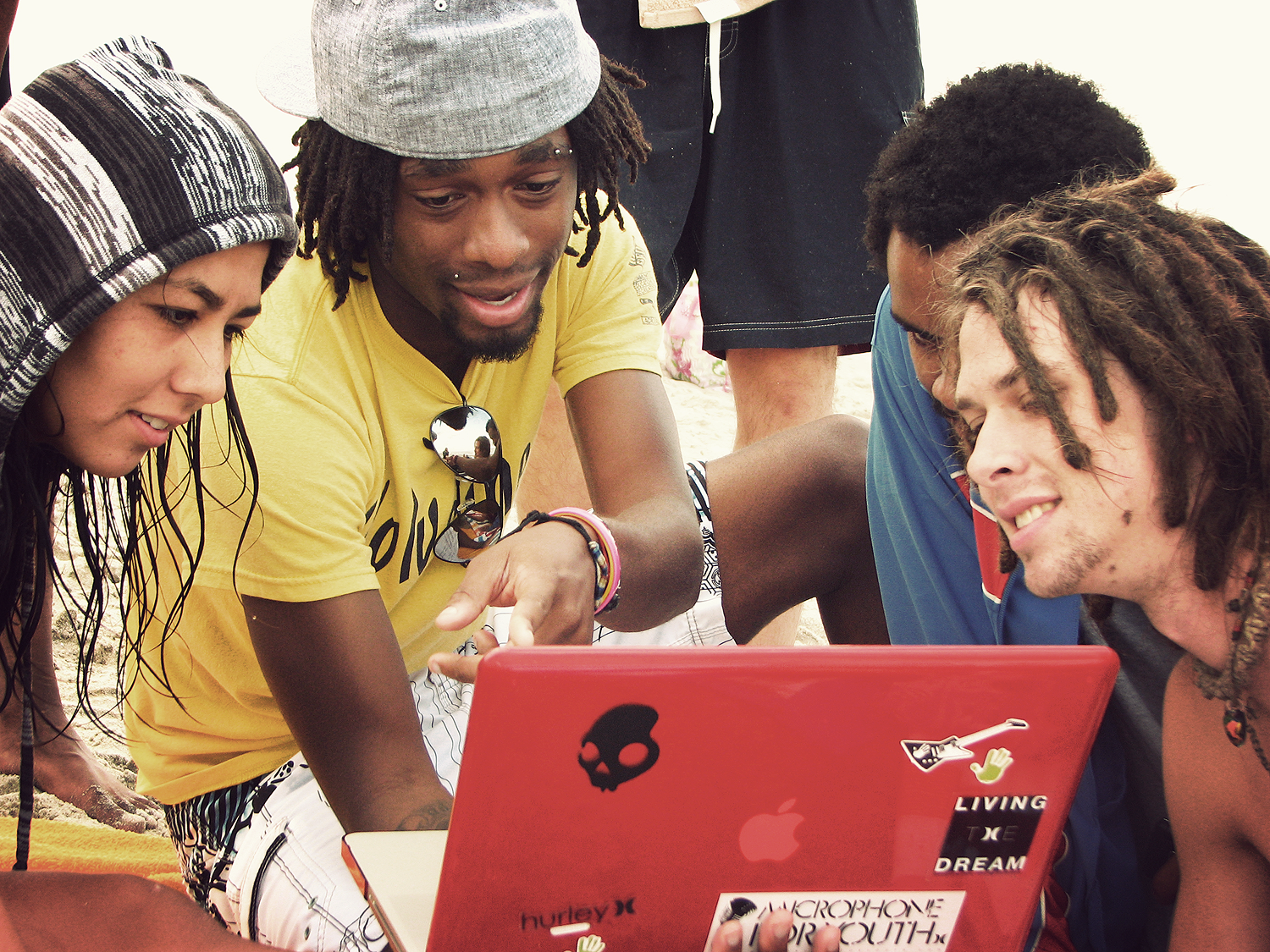 There are no easy solutions to ‘fake news’ or misinformation. They are symptoms of systemic problems. Journalists should challenge them with humility, writes Charlie Beckett (LSE): by looking at how they work, becoming more open about how they source and produce stories, and more emotionally literate about how people feel about and socialise the information they consume.
There are no easy solutions to ‘fake news’ or misinformation. They are symptoms of systemic problems. Journalists should challenge them with humility, writes Charlie Beckett (LSE): by looking at how they work, becoming more open about how they source and produce stories, and more emotionally literate about how people feel about and socialise the information they consume.
‘Fake news’ is a real problem in all its forms: the viral hoaxes created for profit or political disruption, the hyper-partisan distortion, and malicious misinformation. Deliberately-created false information is not new, but it is more extensive and harder to identify or counter than before. Digital technologies and the Internet make it easier to create and spread. It misleads citizens, misrepresents reality and causes damage to the information system itself. It helps create a culture of mistrust, cynicism, relativism and confusion. So it should be a concern, even if you voted for Donald Trump or for the UK to leave the European Union. It damages us all.
As has been pointed out, the term ‘fake news’ has become problematic now that politicians, for example, use it to attack any media that they disagree with it. It is better seen as ‘misinformation’ – including deliberate disinformation or malicious mal-information, including hyper partisan distortion and false propaganda.

There are specific things that can be done by citizens, journalists and networks to identify it, filter and counter it. In the wake of the explosion of misinformation around the US presidential election journalists and civil society organisations have responded, for example, with fact-checking initiatives. The digital giants such as Facebook have started to explore ways to clean up the content they now carry so effectively. However, it could get a lot worse.
Firstly, because governments and other agencies of power are starting to deploy it as weapon in internal political and external diplomatic strategies. Often, they have far greater resources than those seeking to produce good information and the fake news they create deliberately undermines healthy media systems.
Secondly, fake news can exploit new technologies and channels such as closed messaging apps where lies can spread undetected. New video manipulation tools offer even more sophisticated ways to create credible bogus material.
Thirdly, and perhaps most importantly, there is a danger that we will not appreciate that misinformation is a symptom of systemic problems in our information ecosystem. It can’t be ‘solved’ – certainly not in the short term – because this is an endemic condition of our increasingly mediated, complex lives.
So we need to address structural challenges and opportunities presented by ‘fake news’. Those structures are changing profoundly and so must our solutions. We need to think again about fundamental ideas. What do we mean by ‘reason’ or ‘objectivity’, for example? The challenge is not just about eradicating the bad information that we see now, but more importantly, about investing in new and better ways to connect people to better information and healthier debate in the future.
In the short term, so-called ‘fake news’ is good news for journalism. It has been good for the mainstream media business as it reminds the public of the value of credible, professional mainstream journalism. But what are the key questions we should be asking for the future? A new LSE Commission on Truth, Trust and Technology will convene a variety of stakeholders to address these questions and to publish a report that will set out an agenda for the news media, technology companies and wider society to adopt strategies for improving public information around topical issues and events. It will first report on the UK scene but will then become an international project.
Truth
We can see what is ‘fake’ but what is truth in a world of diverse opinions and increasing subjectivity? Are we really in a post-truth world or is it really a multi-truth world? It is generally accepted that in principle the idea of low barriers to entry into media and the proliferation of voice can enhance both democracy and the public sphere. However, mainstream journalism has struggled to cope with this new diversity. It has not convinced the public that it is good enough at understanding and explaining what is happening in our complex world. The wider problem is not just misinformation, but the overabundance of information and sources.
Many of the issues and events that the news media attempts to cover are difficult, long-term and complicated. There is a rising tide of facts and opinions that are brought constantly and immediately into people’s lives through new intimate mobile technologies. So in the face of that perhaps it is not surprising that people increasingly rely on instinctive and emotional responses to consuming and sharing information.
Mainstream media has too often complained about this instead of engaging with emerging new realities. Journalists and other information producers need to think more strategically. Not just about how they create credible, content but how they bring evidence and informed, balanced analysis to where the public are having their conversations and getting their information?
Trust
Fake news is popular partly because of the lack of trust in the news media. The news media were never as trusted as much as it thought. It has often been as fallible, biased and unaccountable as the ‘fake news’ merchants that it likes to criticise. What should it do to be trusted in the future? How can journalism build credibility?
Perhaps we need to redefine what we mean by trust. It should not mean blind faith. Deference is over and forms of scepticism are routine towards authority in general and news media in particular. This can be a healthy, intelligent response that can increase media literacy, especially if media producers are open and ‘I trust the source I agree with’. Trust must become a multi-directional relationship that shares the process of understanding. Certainly, more of a conversation than a lecture, but a dialogue that has effects not just an exchange of views.
Transparency and interactivity are key to this. Journalists should show their sources, admit what they don’t know, find better experts from a wider range of perspectives, listen to your audience through a number of channels and act with greater humility and engagement. Journalists have begun to realise from the experience of the recent elections in the US and UK – and from the Brexit vote and the rise of populism in established democracies in Europe – that mainstream media is ‘out of touch’. It does not reflect the variety of views and experiences of people in a world where a combination of globalisation, technological change and societal shifts have restructured the way we live and communicate. Newsrooms have to go much further to understand and reflect the diversity of the publics they serve. This may involve pursuing different policies of recruitment, commissioning and production as well as marketing.
Trust is not a given, it has to be earned everyday and re-invented for new circumstances. In a world where we rightly encourage scepticism, journalists should be as self-critical of their own conduct, agendas and purpose as they are of others. Journalists do have special rights and a need for independence that allows them to create challenging and unpopular content. However, that does not absolve them from their responsibilities which themselves are changing as media and society puts new demands on information.
Technology
Technology has enabled and amplified misinformation. It has also given journalism new digital tools to create relationships that connect the public to reliable and relevant information and debate. Around the world newsrooms are going on new platforms such as Instagram or Snapchat to reach the public, often offering the opportunity to connect to demographics that traditionally have not consumed mainstream news.
But are journalists doing this to chase advertising and subscriber revenue or is there an editorial strategy that sustains the brand’s quality as well as income? There are too many examples of digital companies who now see audience data, personalisation and engagement as marketing devices rather than a way of building a sustainable relationship. Journalists need to understand much better the role of media in people’s lives and the value that good information can bring to them.
The platforms and networks now face the challenge of facilitating a healthier digital public sphere without compromising on the value of the open internet. Google, Twitter, Facebook and other digital intermediaries are facing increasing pressure to remove offensive, dubious or disruptive information from their networks. They are already changing their algorithms to try to promote ‘good’ content and to steer us away from the ‘bad’. The platforms have removed or closed millions of accounts and material in this clean-up act after pressure from politicians. But how much do we know about the principles that these platforms are acting on?
They can no longer make the dubious claim that they are merely neutral channels. But neither are they traditional publishers with control over a defined editorial product. By pushing them to take more responsibility for the content on their platforms there is a danger that we are ceding more power to relatively unaccountable and inexperienced media corporations. Do we want Mark Zuckerberg as the editor-in-chief of the world’s biggest information distribution system?
Critical is now the state of the relationship between those platforms and the publishers. At present this has been seen as largely an economic question over advertising revenue. Both publishers and platforms now have a common interest in considering the public interest. If they do not then the danger is of authoritarian interventions and the loss of public trust. They need to work together in consultation with civil society to create sustainable and credible information marketplaces.
Conclusion
News media should not abandon traditional journalism values. Journalists have much needed skills in processing information as well as ethical and political values that are needed to foster democracy, healthy societies and efficient economies. But the answer is not to seek a return to a mythical model with journalists as gatekeepers of objectivity. Journalism needs to go with the grain of human nature on social media. They need to think more about the human and political as well as technological reasons why bad information is so popular.
They have a choice about they use audience data. It can be deployed simply to chase traffic and create clickbait. Or it can be used to understand what audiences are interested in, how they use information and to serve them personally with content that is relevant but also stimulating and even challenging. To counter misinformation we need good journalism, but reinvented journalism. We need to make journalism part of the emotional as well as material lives citizens now lead online. Journalists must become more literate about the information systems that are evolving around us. But they must also be more emotionally literate about how people feel about and socialise the information they consume.
This is the (slightly revised) text of an article by Professor Charlie Beckett, director of the LSE’s Truth, Trust and Technology Commission published by the Media Asia journal. It is based on a speech to the Asia Journalism Forum conference on Reporting Facts and the Future of Journalism, Singapore, 17–18 August 2017. You can view a video of the speech, which starts at 24 minutes in, here.
Charlie Beckett is the founding director of Polis, the think-tank for research and debate around international journalism and society in the Department of Media and Communications at the LSE. He is also director of the Media Policy Project and Lead Commissioner for the LSE Truth, Trust & Technology Commission (T3).







Excellent speech by the professor. I would add that fake news itself needs to have both a detailed definition and an indicator of level of harm. For example, a tweet from an unknown tweeter carries weight only with a small number of readers who probably suffer from confirmation bias, but a biased or incorrect BBC or Sky News item reaches millions of people who trust that source and could therefore influence opinion.
We saw clearly that people rapidly came to see MSM as the most egregious purveyors of biased propaganda during the Brexit referendum run up and 2016 US presidential election and reacted strongly against it. The media must take the major responsibility for the results of both. Indeed, in the US example, Trumps campaign realised the effect early on and used the left wing press brilliantly by harnessing the negative reaction to its fake news on a daily basis.
Excellent speech by the professor. I would add that fake news itself needs to have both a detailed definition and a metric showing level of influence of the source and delivery mechanism. For example, a tweet from an unknown tweeter like me carries weight only with a small number of readers who probably have confirmation bias anyway, but a biased or incorrect BBC or Sky News item reaches millions of people who trust that source (or not) and it could therefore influence opinion in a major way.
We saw clearly that people rapidly came to regard the MSM as the most egregious purveyors of biased (fake) news during the Brexit referendum run up and 2016 US presidential election and reacted strongly against it. Facebook and Twitter were pretty much irrelevant as they were used mainly as delivery mechanism for fake news by the media, not its creation. The media must take the major responsibility for the results of both. Indeed, in the US example, Trump’s campaign realised the positive effect in their favour on voters early on, and used the left wing press brilliantly by harnessing the public reaction to fake news on a daily basis.
As soon as the MSM realise their power to influence the electorate has been fully reversed in the last 2 years, the better. The public have reacted against previously trusted sources in sufficient numbers to return stunning successes to the candidate or position least supported by the MSM. This of course makes the level of influence metric mentioned above a tricky thing to interpret. Is the fake news item influencing people for or against its intended target?
For a period of time, we have been in the Wild West of mainstream journalism where journalists are the cowboys. Today like many others, I treat all news with suspicion to the extent that I no longer watch news programmes nor do I read newspapers except to marvel at the abysmal level journalism has reached today.